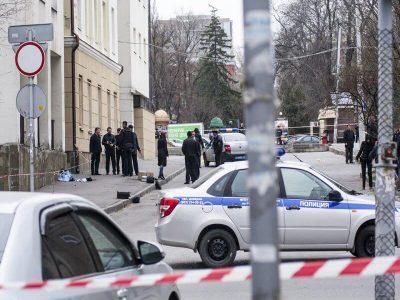
Russian authorities detain possible accomplices of presumed St. Petersburg bomber
Russian investigators said Thursday that they have arrested eight possible accomplices in the St. Petersburg subway attack Monday that killed 14 people and wounded dozens more, and a Russian news agency reported that the suspected bomber may have trained with the Islamic State in Syria.
The explosion in the heart of Russias cultural capital shocked the nation and brought outpourings of grief, followed by three days of mourning. The first subway bombing in seven years also pierced a sense of security in Russia, and authorities moved Thursday to ease those fears.
As thousands of Russians attended carefully staged rallies in major cities across the country, state television broadcast dramatic footage of police breaking into a St. Petersburg apartment and bringing out three men in handcuffs.
The Investigative Committee, a federal authority with broad powers, said six people were detained in St. Petersburg and two more in Moscow. Investigators also turned up explosives identical to those police discovered in another St. Petersburg station soon after the subway attack.
The arrests are considered a possible breakthrough in the investigation of what led Akhbarzhon Dzhalilov, a 22-year-old Uzbek who came to Russia from a volatile area of Kyrgyzstan, allegedly to detonate a bomb on a train as it traveled between two central St. Petersburg subway stations. Investigators so far have been unable to determine whether Dzhalilov acted alone or with accomplices. No group has claimed responsibility.
the impoverished, predominantly Muslim, Central Asian countries that sprang from the ruins of the Soviet Union and have become breeding grounds for Islamist fundamentalism. The Islamic State is believed to have recruited thousands of residents of these countries to join the militant movement in its strongholds in Iraq and Syria.
The Fontanka.ru agency said Dzhalilov had traveled to Syria in 2014 and trained with Islamic State militants. The report said Russian investigators were trying to determine his travels, but they had ascertained that the device used in the subway attack bore the hallmarks of Syrian know-how, specifically traces of burnt sugar.
In Moscow, at least 10,000 people gathered in a square outside the red brick Kremlin wall for a hastily organized rally titled Piter, were with you! using Russian slang for St. Petersburg. Participants streamed into the square to the beat of pop music, many carrying red carnations.
There had been suspicions in Moscow about the motives of the organizers of the event, especially after an item since deleted appeared on the site massovki.net offering to pay $7 to anyone willing to sign up to attend the gathering. The site is often used to attract crowds to television shows, concerts and pro-Kremlin rallies.
Some analysts suspected that authorities had organized the demonstrations, and urged people to attend, to show that they could get at least as many people out in the street as opposition leader Alexei Navalny did March 26, when tens of thousands across Russia rallied against official corruption.
This is an indirect response to the mass rallies against corruption, the large scale of which came as a surprise to the authorities, Alexei Makarkin, an analyst at the Center for Political Technologies, told the Vedemosti newspaper. Thursdays anti-terrorism rallies, he said, were intended to demonstrate that the opposition rallies were small in number.
Source: /Washington Post





